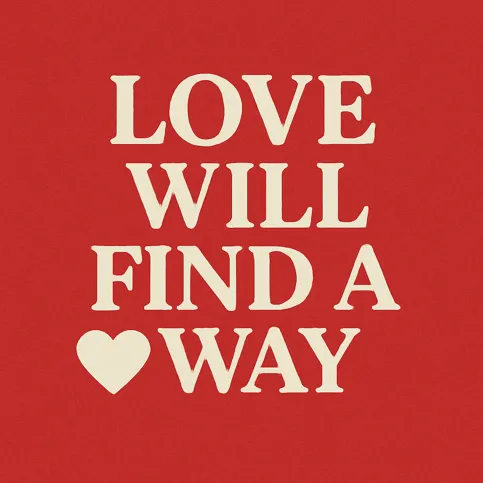What is the meaning of the phrase “love will find a way”?
Love is strong and powerful enough to overcome any obstacle put before it.
What is the origin of the phrase “love will find a way”?
The precise initial origin of the phrase “love will (always) find a way” is not known, though it likely evolved as a folk proverb.
A similar phrase came from Latin, specifically “Amor vincit omnia” which translates as “Love conquers all”. The Roman poet Virgil used it in his tenth Eclogue, with the line “Omnia vincit amor: et nos cedamus amori” which translates as “Love conquers all; let us, too, yield to love!”. It was uttered by a lovesick character named Gallus. In this poem, dating back to first century BCE, the phrase is used to express the overwhelming and inescapable nature of love.
Of course, as you may imagine, this concept continued across millenia. For example, it also appeared in The Canterbury Tales, written by Geoffrey Chaucer in the late 14th century. Chaucer used the phrase to portray a character as someone interested in both courtly and spiritual love, perhaps even as a social climber who uses religious life for personal gain.
The exact wording of “love will find a way” appears a while later however, though the idea of love overcoming barriers is deeply embedded in Western literary and philosophical traditions.
One of the earliest known appearances of the precise phrase comes from the 17th and 18th centuries, when it even became the title of a popular anonymous Elizabethan or Jacobean ballad, titled “Love will find out the way”. It was printed in broadside form, and circulated throughout the 17th century. This brought the phrase into popular usage, emphasising that true love would surmount obstacles, such as parental disapproval, war, distance, or disguise. This became a common theme in sentimental novels of the time, where lovers thwarted by social norms or economic barriers often prevailed by holding fast to their devotion.
Later this theme also appeared in Victorian literature in the 19th century, and in the 20th century, the phrase continued to resonate, appearing in romance novels, plays, and screenwriting. It became shorthand for a narrative arc that has particular resonance in the context of social change, in contexts where love defies convention, adversity or social boundaries – from war-time romances and cross-class romances, through to LGBTQ+ narratives, and intercultural relationships.
Different interpretations of the phrase “love will find a way”
Today, the phrase “love will (always) find a way” is typically used to refer to romantic love conquering whatever challenges or obstacles may be in the way. However, it can also be interpreted as a belief in fate and destiny, or a holy masterplan, where what is meant to be, will be.
The phrase is also used to portray how love can be a force that brings people together no matter what, and it can also imply that love is not easily broken and will persist, finding ways to endure and thrive even when faced with adversity.
How to use the phrase “love will find a way”
The phrase “love will (always) find a way” is an inspirational message, intended to convey a hopeful and optimistic outlook. It is predominantly used in a romantic context, to reassure someone, or a couple, that they can overcome any difficulties they may face if their love is true.
That said, however, the phrase can also be used to reassure children whose parents are going through a break-up, or even in the context of personal growth and healing, or of a collaboration on a special project.
Notable uses of the phrase “love will find a way”
In addition to its use in literature the phrase has also cropped up in music and film. For instance, it appeared as the title of a soft rock song by Pablo Cruise in 1978, to convey themes of enduring affection and emotional recovery following heartbreak.
The phrase was also used in the title of a soulful track by Lionel Richie released in 1983, that reflected optimism and emotional perseverance.
One of the most iconic modern uses of the phrase is in the song “Love Will Find a Way” from the Disney film The Lion King II: Simba’s Pride, released in 1998. It’s a duet sung by the characters Kiara and Kovu and it speaks to the the central theme of the film, which is reconciliation and unity through love, even in the face of deep-rooted divisions.

